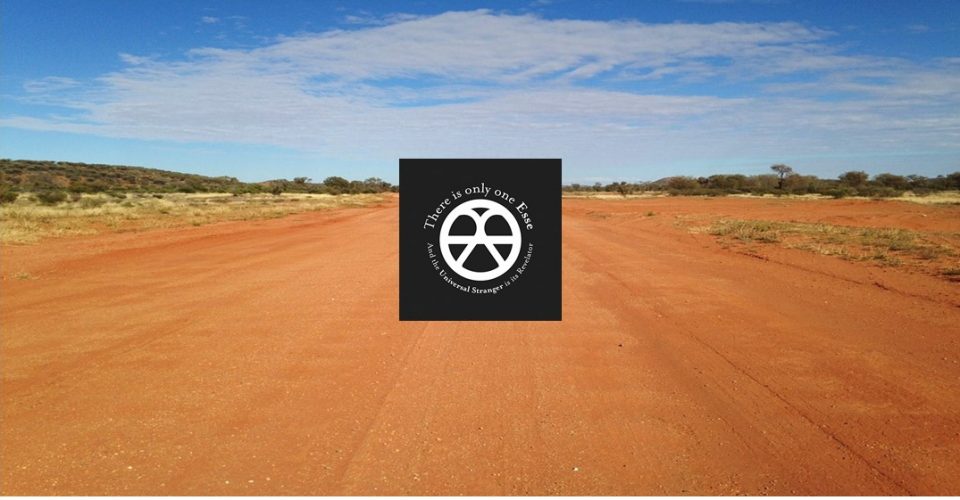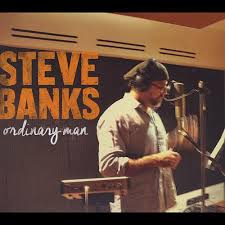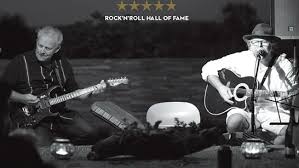One of the characteristics of the Old Wave that sets it apart from the rest of contemporary music is the depth and breadth of life experience behind the songs. That is exemplified nowhere better than on Steve Banks’ album, Ordinary Man*.
It’s Banks’ first album, but it captures a lifetime of highs and lows he’s experienced as a businessman, family man and—by no means least—a phenomenally talented singer, songwriter, guitarist and live performer.
These three quite distinct themes find expression in a fusion of blues, rock and soul which feels and sounds completely natural rather than conceptually driven.
Partly this is because of the extent to which Banks has absorbed and integrated these styles in his highly personal approach to musical self-expression. In the album’s flawless execution, it’s also a reflection of the close working relationship between Banks and his producer Jeff Burstin, former lead guitarist with the Black Sorrows and Jo Jo Zep & The Falcons.
Burstin—as his current work with Melbourne-based The Hornets attests—is a blues man through and through, and it’s the blues sensibility that helps to give the album its overall unity. The blues is quite rightly respected here as the Old Testament of modern popular music, but a willingness to infuse it with a contemporary feel makes its influence timeless rather than dated, and comes close to giving the album a classic quality.
Double trouble: Burstin (L) and Banks live in Byron Bay
There are no duff tracks and all stand tall, some very much so. The first, “The Way That It Is”, is what used to be known as a breezy little opener. It kicks off with a nail-it-down-tight drum intro followed by a brass riff that adds a touch of big-band swing which not only manages to avoid overwhelming the punchy compactness of the song but also complements Banks’ smoky vocal perfectly. It’s a classic tale of man chases woman and gets caught in his own trap (“I was in need of inspiration/She took me from behind…”) and introduces the relationships theme in a positive light.
“Money”, is a soulful lament about materialism (“You talk about money like you’ve had some for a while/You talk about money like it’s going out of style”) which is complemented neatly by the next track, “Like Robbie Says”, a tribute to The Band’s former guitarist, now solo artist, Robbie Robertson. It’s a laid back country rock number which nicely captures The Band’s feel for Americana with a plea to free the spirit from the shackles of the social media age.
“Throw Me a Bone” combines great Stax brass with funky guitar to tell an all-too-familiar tale of a man trying to redeem himself in the eyes of a woman (“I’ve been walking, stalking the night/Trying to think of ways and means of making this right”) but it’s the next track, “Millie’s Song”, that really takes the relationships theme into Old Wave territory. It’s a beautiful tribute to Banks’ daughter, written for her 21st birthday, that could bring a tear to the eye of any proud parent. Not the least of its strengths is the killer line: “You had me at the ultrasound”.
The relationships theme takes a dark turn with “I Wonder How You Sleep”, payback for a business relationship sabotaged by betrayal—a pain made all the worse by the fact that the relationship had been based on close personal friendship (“The mistake I made was trusting you with my life and family/ I gave you all that I could give, you repaid me ruthlessly”). Expletives are two a penny on albums these days, but the one used here is heartfelt and almost chilling in its effect.
The title of “Me, Innit” betrays Banks’ Mancunian roots and the track is probably the most reflective on the album, looking back on a successful life but wondering how much of that success was the result of personal authenticity and how much the result of an ability to bluff others. It’s a brave song, laying open Banks’ insecurities for all to see.
“Gotta Get My Balls Back” is also highly personal. I have it on good authority that the song references a dark period in Banks’ life which involved, by Old Wave standards, some pretty serious substance abuse—a liking for herbal tea and gluten-free bread. I’m pleased to report that, after a stern talking-to by said Millie, our man is now back on the beer and chip butties. Driven along by Burstin’s aggressive 12-bar walking blues, it’s a great track for harmonica players to vamp along to.
The fun continues with “Fitzroy Rag”, one of several tracks co-written by Banks and Burstin, and a colourful homage to one of Melbourne’s more famous suburbs, not far from where the album was recorded.
Easily one of the album’s highlights is the title track, “Ordinary Man”, a deeply affecting elegy for a dearly loved brother. It’s one of those rare works of art where any attempt at criticism feels like an act of trespass, so I’ll restrict my comments to referencing The Band again and comparing the song to “It Makes No Difference”, written by Robbie Robertson and sung, heart-rendingly, by Rick Danko.
Both these songs, for my money, stand apart for emotional depth and delivery. The fact that more than 40 years separate them says a lot not only about the rare quality of Banks’ writing and singing, but also the extent to which he has absorbed and continues a great musical tradition.
The two final tracks—the bluesy “Give You My Mind” and the evocative sixties-style surf instrumental (complete with theremin) “Castaway”—round out the album to a very satisfying conclusion.
Available on iTunes and highly recommended.
*Full disclosure: Banks has a history of collaboration with Universal Stranger’s songwriter-in-residence, Rody. For more on the Old Wave, click here.


